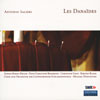Salieri (Les) Danaides
Salieri second-rate? This gory tale of Greek slaughter suggests otherwise
View record and artist detailsRecord and Artist Details
Composer or Director: Antonio Salieri
Genre:
Opera
Label: Oehms
Magazine Review Date: 4/2008
Media Format: CD or Download
Media Runtime: 112
Mastering:
Stereo
DDD
Catalogue Number: OC909

Tracks:
| Composition | Artist Credit |
|---|---|
| (Les) Danaides |
Antonio Salieri, Composer
Antonio Salieri, Composer Christoph Genz, Lyncée, Tenor Hans Christoph Begemann, Danaüs Kirsten Blaise, Plancippe Ludwigsburg Festival Choir Ludwigsburg Festival Orchestra Michael Hofstetter, Conductor Sophie Marin-Degor, Hypermnestre, Soprano |
Author: Richard Lawrence
Danaus, king of Argos, marks a pretended reconciliation with his brother Aegyptus by marrying his 50 daughters - the Danaids - to their cousins. He commands them to kill their bridegrooms on the wedding night, the oracle having foretold his death at the hands of one of the sons. All agree except for Hypermnestra, who loves Lynceus and is torn between loyalty and love. The inevitable misunderstanding follows; 49 brothers are murdered, but Lynceus attacks with his troops, who kill father and daughters. In the underworld, Danaus and the Danaids are seen, their entrails being devoured for ever by a vulture and “terrible snakes”.
The music is very much in the style of Gluck, Salieri's mentor and friend. First performed in 1784, Les Danaïdes, like the contemporary Oedipe à Colone by Sacchini, was much admired by Berlioz; and, like Oedipe, it takes a while to get going. It starts splendidly, with a stern introduction to the overture. The first act is pretty bland; but, far more often than not, Salieri writes with a force and expressiveness that should scotch any idea of his being a second-rate hack. Hypermnestra pleads with her father in a slow G minor air that looks forward to Pamina; later, she has a despairing recitative, introduced by a lamenting figure in the violins, which is followed by an equally vivid air. Sophie Marin-Degor is superb throughout, singing with bright, forward tone.
Hans Christoph Begemann brings a nervous energy to the role of the villainous Danaus. His handling of the recitatives shows flexibility and dramatic conviction. Christoph Genz sings gracefully but he does not sound so involved. Michael Hofstetter conducts his Ludwigsburg forces with a sure hand: particularly impressive is the last scene, where Salieri depicts the unending torments of Danaus and his daughters in music of a ferocity that recalls Gluck's Don Juan and anticipates Mozart's Don Giovanni. This enterprising issue deserves to be supported.
Discover the world's largest classical music catalogue with Presto Music.

Gramophone Digital Club
- Digital Edition
- Digital Archive
- Reviews Database
- Full website access
From £8.75 / month
Subscribe
Gramophone Full Club
- Print Edition
- Digital Edition
- Digital Archive
- Reviews Database
- Full website access
From £11.00 / month
Subscribe
If you are a library, university or other organisation that would be interested in an institutional subscription to Gramophone please click here for further information.




